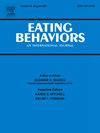Bicultural identity integration, depressive symptoms, and emotional eating among Asian and Latino undergraduate students in the U.S
IF 2.4
3区 医学
Q2 PSYCHIATRY
引用次数: 0
Abstract
College students increasingly identify as bicultural. Bicultural identity integration (BII), the extent to which an individual can effectively manage their various cultural identities, has been associated with mental health, including depressive symptoms. However, few studies have examined the association between BII and eating behaviors among racial/ethnic minority students, even though these students are at high risk for disordered eating behaviors. The primary goals of the present study were to examine the association between BII and emotional eating, and whether depressive symptoms represent an indirect pathway in the association. Asian and Latino undergraduate college students in the U.S. (N = 497; age range: 18–46 years, M = 20.81) completed online standardized questionnaires assessing demographics, BII, depressive symptoms, and emotional eating. Higher scores on BII harmony, not blendedness, were associated with fewer depressive symptoms (r = − 0.16, p < .001) and less emotional eating (r = − 0.13, p < .001). Moreover, depressive symptoms were the indirect pathway between BII harmony and emotional eating (b = − 0.15, p = .003, 95%CI boot [− 0.25, − 0.05]), but not between BII blendedness and emotional eating (b = − 0.04, p = .42, 95%CI boot [− 0.15, 0.06]). The results can help inform counseling services about the need to address cultural harmony to promote healthy eating behaviors, mental health, and well-being among bicultural undergraduate students.
美国亚裔和拉丁裔大学生的双文化认同融合、抑郁症状和情绪性饮食
越来越多的大学生认同自己是双文化人。双文化身份融合(BII),即一个人能够有效管理其各种文化身份的程度,与心理健康(包括抑郁症状)有关。然而,很少有研究探讨少数民族学生的 BII 与饮食行为之间的关系,尽管这些学生是饮食失调行为的高危人群。本研究的主要目的是探讨 BII 与情绪化进食之间的关联,以及抑郁症状是否是这种关联的间接途径。美国亚裔和拉丁裔本科大学生(人数 = 497;年龄范围:18-46 岁,平均年龄 = 20.81)填写了在线标准化问卷,对人口统计学、BII、抑郁症状和情绪化进食进行了评估。在 BII 和谐性(而非混合性)方面得分越高,抑郁症状越少(r = - 0.16,p<0.05)。
本文章由计算机程序翻译,如有差异,请以英文原文为准。
求助全文
约1分钟内获得全文
求助全文
来源期刊

Eating behaviors
Multiple-
CiteScore
4.20
自引率
3.60%
发文量
65
审稿时长
60 days
期刊介绍:
Eating Behaviors is an international peer-reviewed scientific journal publishing human research on the etiology, prevention, and treatment of obesity, binge eating, and eating disorders in adults and children. Studies related to the promotion of healthy eating patterns to treat or prevent medical conditions (e.g., hypertension, diabetes mellitus, cancer) are also acceptable. Two types of manuscripts are encouraged: (1) Descriptive studies establishing functional relationships between eating behaviors and social, cognitive, environmental, attitudinal, emotional or biochemical factors; (2) Clinical outcome research evaluating the efficacy of prevention or treatment protocols.
 求助内容:
求助内容: 应助结果提醒方式:
应助结果提醒方式:


